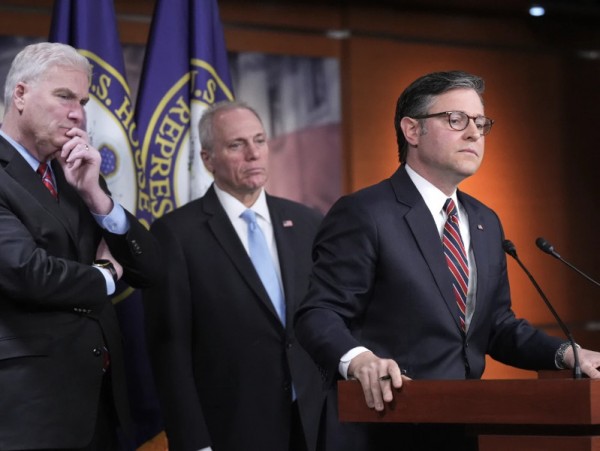WASHINGTON (AP) — The 119th Congress is convening for the first time on Friday and House Speaker Mike Johnson is fighting for his political life — again.
While the Louisiana Republican has the support of President-elect Donald Trump, it will be House Republicans who will decide whether to reelect him to his post as Speaker of the House. Far-right Republicans have at times grown frustrated with Johnson’s leadership and are prone to demanding concessions when their votes become essential.
A flop by Johnson could throw Monday’s congressional certification of Trump’s 2024 election victory into turmoil without a House speaker.
Here's the latest:
Rep. Stacey Plaskett, who represents the U.S. Virgin Islands, received cheers and jeers as she inquired why members of Congress elected by U.S. territories were not included in the roll call for House speaker.
“We are collectively the largest per capita of veterans in this country,” said Plaskett, who added that the territories are home to more than 4 million American citizens.
The territories include Plaskett’s home territory of the U.S. Virgin Islands, American Samoa, the District of Columbia, Guam, Puerto Rico and the Northern Mariana Islands
“We must do something about this problem,” Plaskett said as she received a standing ovation from her Democratic colleagues and calls for “order” from Republicans across the aisle.
Only members of Congress elected from U.S. states are eligible to vote for speaker.
His allies are talking to some of the holdouts on the House floor.
Speaker Mike Johnson walked off the floor as the first ballot for his speaker’s race was coming to a close.
Three Republicans voted for other candidates besides Johnson.
Texas Rep. Keith Self voted for Rep. Byron Donalds of Florida for House Speaker, in lieu of Rep. Mike Johnson.
It is the third GOP defection from the incumbent speaker.
With Reps. Thomas Massie and Ralph Norman both voting for candidates that are not Johnson, the Louisiana Republican is now at risk of losing his first ballot for speaker.
There were several far-right members who abstained from voting thus far and could potentially vote at the end.
Former House Speaker Nancy Pelosi received a standing ovation from her Democratic colleagues when she cast a vote for Jeffries, her successor as Democratic minority leader, to serve as House Speaker.
The two, sitting across the aisle from each other in the chamber, embraced for a quick hug before voting resumed.
Kentucky Rep. Thomas Massie kept to his word on Friday in voting against Johnson for speaker on the first roll call vote, voting instead for the No. 3 Republican, Rep. Tom Emmer.
Reps. Hakeem Jeffries and Mike Johnson received back-to-back standing ovations from their respective sides of the aisle as they each cast votes for themselves to serve as speaker of the House.
They are standing in the back row of the chamber. It’s unclear if they will vote at the end of the roll call when the clerk calls their name again.
Rep. Lisa McClain, R-Mich., said achieving perfection requires incremental gains and hard decisions.
“None of us will get exactly what we want,” she said.
The message is aimed at some of the most conservative members of the House Republican conference who have come into Friday’s vote without previously committing to Johnson.
House Republican Conference Chair Lisa McClain kicked off the speaker election by nominating Mike Johnson to be the speaker for the 119th Congress.
1. Nominations
Once the House is in a quorum — meaning the minimum number of members are present to proceed — nominating speeches will be made on behalf of the nominees for speaker. Republicans chose Johnson as their nominee for speaker in a closed-door vote in November. A week later, Democrats unanimously chose Rep. Hakeem Jeffries, D-N.Y., to remain their leader despite the party’s electoral losses.
2. Voting
Lawmakers call out the name of their choice for speaker from the floor, a rare and time-consuming roll call. Members often liven up the proceedings by shouting or standing when casting their vote. Lawmakers are not obligated to vote for their party’s nominated candidate. Any name can be called out from the House floor. While it has been the tradition for the speaker to be a member of the House, it is not required.
3. Results
Should Johnson come up short, it is likely the clerk will move immediately to start another roll call vote. If a speaker candidate wins a majority of those present and voting, a bipartisan committee, usually consisting of members from the home state of the chosen candidate, will escort the speaker-elect to the chair on the dais where the oath of office is administered.
As Johnson’s political fate hangs in the balance, members are using this time to take selfies with the Louisiana Republican.
GOP lawmakers are bringing their babies, grandbabies and siblings to take a photo with the speaker before the House begins his reelection vote.
The next speaker must receive a majority of the votes cast. If not, balloting continues until someone meets that threshold.
Two years ago, it took Kevin McCarthy 15 rounds of balloting before he gained enough support to take the gavel.
Those voting won their election in November, but they cannot take the oath of office until a new speaker has been elected.
New and returning lawmakers donned their Sunday best to the first day of the new Congress, with many of the women adhering to the traditional colors of their political party.
Red ties and dresses for Republican members can be seen scattered across the House floor while across the aisle Democratic women styled various shades of blue.
Johnson commands one of the slimmest majorities in modern times, 220-215, having lost seats in the November election.
The abrupt resignation of Rep. Matt Gaetz of Florida drops his tally to 220.
That leaves him relying on almost every Republican for support in the face of Democratic opposition, though the typical 218 majority needed could shift with absences and others voting only “present.”
Before his election for speaker can begin, Speaker Mike Johnson opened Friday’s session by declaring that the 118th Congress has come to a close.
On his way to the House floor earlier, he was asked by reporters if he will win the speakership during the first round of voting.
“I hope so. We’ll see,” he said.
Lawmakers are quickly filtering into the House chambers for the start of the 119th Congress, where the first order of business will be a quorum call and then a roll call vote to elect the next speaker.
For now, it’s a festive atmosphere with many lawmakers bringing their children onto the House floor with them to take in some history.
Soon, it will become more serious as the speaker vote is held.
Rep. Mike Johnson, R-La., has the backing of President-elect Donald Trump, but can’t afford hardly any holdouts from the Republican side of the room if he hopes to return to holding the gavel.
Democratic lawmakers are standing and applauding as Democratic Rep. Nancy Pelosi has entered the House chamber as a new Congress begins to gather.
The former speaker had hip replacement surgery recently at a U.S. military hospital in Germany after falling while at an event in Luxembourg with other members of Congress.
The former speaker walked gingerly to a seat in the middle of the chamber. Several colleagues moved quickly to greet her.
New and returning lawmakers walked around the chamber, taking selfies with their children and families ahead of what is expected to be a contentious few hours as Republicans fight amongst themselves to elect a speaker.
Johnson commands one of the slimmest majorities in modern times, 220-215, having lost seats in the November election. That leaves him relying on almost every Republican for support in the face of Democratic opposition.
Here’s a look at some of the Republicans who’ve signaled they may vote against him:
1. Texas Rep. Chip Roy: Roy is an unflinching member of the Freedom Caucus who lashed into Republican leadership’s handling of the year-end spending bill for failing to cut spending and adhere to House rules. He said he was undecided on the speaker’s vote for Johnson, but added “my desire is to give him grace” in hopes they can deliver on the GOP agenda.
2. Indiana Rep. Victoria Spartz: Spartz said on Tuesday that she was still undecided and doubted Johnson’s ability to deliver on Trump’s agenda. “I would give him a chance, but I would like to hear from him on what plan he has,” she told Fox News.
3. Kentucky Rep. Thomas Massie: Massie is a near-certain no. “You can pull all my fingernails off, you can shove bamboo up them, you can start cutting off my fingers, I am not voting for Mike Johnson tomorrow,” Massie said in an interview on One America Network that aired last night.In a Friday morning post on X, he reiterated that stance, saying “Johnson isn’t the right guy.”
The speaker’s election is set to dominate the opening of the new Congress, but the day will also bring a roster of history-making members.
In the Senate, two Black women — Lisa Blunt Rochester of Delaware and Angela Alsobrooks of Maryland — will be sworn in, the first time in the nation’s history two Black women senators will serve at the same time.
Sen.-elect Andy Kim of New Jersey also is making history as the first Korean American to join the chamber.
In the House, Sarah McBride is the first openly transgender person in the Congress.
And Speaker Emerita Nancy Pelosi, who recently suffered a fall overseas and underwent hip replacement surgery, will make her own return to Washington, a reminder of the power she wielded when Democrats last held the majority.
The speakership has been vacant only 13 times in U.S. history, according to the nonpartisan Congressional Research Service. No speaker had ever been removed until eight Republicans joined with Democrats to oust McCarthy.
Barring those instances, a speaker is normally elected at the start of a new Congress and serves in the job for the full two-year session.
House Speaker Mike Johnson walked into the Capitol on Friday morning seemingly optimistic about his chances of being reelected speaker by his conference despite growing frustrations amongst far-right members of the party.
When asked by a reporter what his message was to his holdouts, the Louisiana Republican said, “We need to unify,” adding that the speaker election “is not just about one person but about moving forward with the America First agenda, the mandate given forward by the American people.”
Johnson denied that he was making any back-door deals.
“There is no quid pro quo here. I don’t do anything in exchange for a vote other than commit to make this institution work as effectively and efficiently as possible,” he said.
President-elect Donald Trump called the U.S. House speaker “a fine man of great ability” and wished him good luck on Friday, when the new Congress convenes and Republican lawmakers will decide whether to reelect Mike Johnson to lead their party.
Trump endorsed the Louisiana Republican earlier this week, but whether that support will be enough is unclear. Trump said Johnson “is very close to having 100% support,” but some members of the far right have grown increasingly frustrated with Johnson’s leadership and his handling of funding fights such as the recent short-term spending bill.
“A win for Mike today will be a big win for the Republican Party,” Trump posted on Truth Social.
Johnson’s weak grip on the gavel threatens not only his own survival but Trump’s ambitious agenda of tax cuts and mass deportations as Republicans sweep to power in Washington.
A flop by Johnson could throw Monday’s congressional certification of Trump’s 2024 election victory into turmoil if there is no speaker.
Johnson commands one of the slimmest majorities in modern times, having lost seats in the November election, leaving him relying on almost every Republican for support and with nearly no votes to spare.
Electing a speaker is the first order of business for the U.S. House after a new session of Congress begins at noon. It’s a vote that members take even before being sworn into office.
The House cannot organize until it has a speaker because that person effectively serves as the House’s presiding officer and the institution’s administrative head. The House can elect a new speaker at any time if the person occupying that role dies, resigns or is removed from office.

















